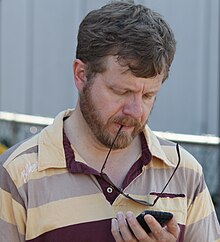In analytic philosophy, anti-realism is a position which encompasses many varieties such as metaphysical, mathematical, semantic, scientific, moral and epistemic. The term was first articulated by British philosopher Michael Dummett in an argument against a form of realism Dummett saw as 'colorless reductionism'.

Free will is the capacity or ability to choose between different possible courses of action.

Hilary Whitehall Putnam was an American philosopher, mathematician, computer scientist, and figure in analytic philosophy in the second half of the 20th century. He contributed to the studies of philosophy of mind, philosophy of language, philosophy of mathematics, and philosophy of science. Outside philosophy, Putnam contributed to mathematics and computer science. Together with Martin Davis he developed the Davis–Putnam algorithm for the Boolean satisfiability problem and he helped demonstrate the unsolvability of Hilbert's tenth problem.
Moral realism is the position that ethical sentences express propositions that refer to objective features of the world, some of which may be true to the extent that they report those features accurately. This makes moral realism a non-nihilist form of ethical cognitivism with an ontological orientation, standing in opposition to all forms of moral anti-realism and moral skepticism, including ethical subjectivism, error theory, and non-cognitivism. Moral realism's two main subdivisions are ethical naturalism and ethical non-naturalism.

John Henry McDowell is a South African philosopher, formerly a fellow of University College, Oxford, and now university professor at the University of Pittsburgh. Although he has written on metaphysics, epistemology, ancient philosophy, nature, and meta-ethics, McDowell's most influential work has been in the philosophy of mind and philosophy of language. McDowell was one of three recipients of the 2010 Andrew W. Mellon Foundation's Distinguished Achievement Award, and is a Fellow of both the American Academy of Arts & Sciences and the British Academy.
Scientific realism is the view that the universe described by science is real regardless of how it may be interpreted. A believer of scientific realism takes the universe as described by science to be true, because of their assertion that science can be used to find the truth about both the physical and metaphysical in the Universe.

Incompatibilism is the view that the thesis of determinism is logically incompatible with the classical thesis of free will. The term was coined in the 1960s, most likely by philosopher Keith Lehrer. The term compatibilism was coined to name the view that the classical free will thesis is logically compatible with determinism, i.e. it is possible for an ordinary human to exercise free will, even in a universe where determinism is true. These terms were originally coined for use within a research paradigm that was dominant among academics during the so-called "classical period" from the 1960s to 1980s, or what has been called the "classical analytic paradigm". Within the classical analytic paradigm, the problem of free will and determinism was understood as a compatibility question: "Is it possible for an ordinary human to exercise free will when determinism is true?" Those working in the classical analytic paradigm who answered "no" were incompatibilists in the original, classical-analytic sense of the term, now commonly called classical incompatibilists; they proposed that determinism precludes free will because it precludes the ability to do otherwise. Those who answered "yes" were compatibilists in the original sense of the term, now commonly called classical compatibilists. Given that classical free will theorists agreed that it is at least metaphysically possible for an ordinary human to exercise free will, all classical compatibilists accepted a compossibilist account of free will and all classical incompatibilists accepted a libertarian account of free will.
In philosophy, an action is an event that an agent performs for a purpose, that is, guided by the person's intention. The first question in the philosophy of action is to determine how actions differ from other forms of behavior, like involuntary reflexes. According to Ludwig Wittgenstein, it involves discovering "[w]hat is left over if I subtract the fact that my arm goes up from the fact that I raise my arm". There is broad agreement that the answer to this question has to do with the agent's intentions. So driving a car is an action since the agent intends to do so, but sneezing is a mere behavior since it happens independent of the agent's intention. The dominant theory of the relation between the intention and the behavior is causalism: driving the car is an action because it is caused by the agent's intention to do so. On this view, actions are distinguished from other events by their causal history. Causalist theories include Donald Davidson's account, which defines actions as bodily movements caused by intentions in the right way, and volitionalist theories, according to which volitions form a core aspect of actions. Non-causalist theories, on the other hand, often see intentions not as the action's cause but as a constituent of it.

Libertarianism is one of the main philosophical positions related to the problems of free will and determinism which are part of the larger domain of metaphysics. In particular, libertarianism is an incompatibilist position which argues that free will is logically incompatible with a deterministic universe. Libertarianism states that since agents have free will, determinism must be false and vice versa.
A philosophical zombie is a being in a thought experiment in philosophy of mind that is physically identical to a normal human being but does not have conscious experience.
In philosophy, moral responsibility is the status of morally deserving praise, blame, reward, or punishment for an act or omission in accordance with one's moral obligations. Deciding what counts as "morally obligatory" is a principal concern of ethics.

Quietism in philosophy sees the role of philosophy as broadly therapeutic or remedial. Quietist philosophers believe that philosophy has no positive thesis to contribute; rather, it defuses confusions in the linguistic and conceptual frameworks of other subjects, including non-quietist philosophy. For quietists, advancing knowledge or settling debates is not the job of philosophy, rather philosophy should liberate the mind by diagnosing confusing concepts.

Keith DeRose is an American philosopher teaching at Yale University in New Haven, Connecticut, where he is currently Allison Foundation Professor of Philosophy. He taught previously at New York University and Rice University. His primary interests include epistemology, philosophy of language, philosophy of religion, and history of modern philosophy. He is best known for his work on contextualism in epistemology, especially as a response to the traditional problem of skepticism.
Paul Humphreys (1950-2022) was a British professor of philosophy at the University of Virginia, specialising in philosophy of science, metaphysics, and epistemology. His interests included the metaphysics and epistemology of emergence, computational science, empiricism and realism.
Brian Ellis is an Australian philosopher. He is an Emeritus Professor in the philosophy department at La Trobe University in Victoria, Australia, and Professional Fellow in philosophy at the University of Melbourne. He was the Editor of the Australasian Journal of Philosophy for twelve years. He is one of the major proponents of the New Essentialist school of philosophy of science. In later years he has brought his understanding of scientific realism to the Social Sciences, developing the philosophy of Social Humanism. He was appointed a Fellow of the Australian Academy of the Humanities in 1972.
Patricia Greenspan is a professor of philosophy at the University of Maryland, College Park. Greenspan works in analytic philosophy of action, and is known for work on rationality, morality, and emotion that helped to create a place for emotion in philosophy of action and ethics.

Anil K. Gupta is an Indian-American philosopher who works primarily in logic, epistemology, philosophy of language, and metaphysics. Gupta is the Alan Ross Anderson Distinguished Professor of Philosophy at the University of Pittsburgh. He is also a Fellow of the American Academy of Arts and Sciences. His most recent book, Conscious Experience: A Logical Inquiry, was published by Harvard University Press in 2019.

Teleology in biology is the use of the language of goal-directedness in accounts of evolutionary adaptation, which some biologists and philosophers of science find problematic. The term teleonomy has also been proposed. Before Darwin, organisms were seen as existing because God had designed and created them; their features such as eyes were taken by natural theology to have been made to enable them to carry out their functions, such as seeing. Evolutionary biologists often use similar teleological formulations that invoke purpose, but these imply natural selection rather than actual goals, whether conscious or not. Some biologists and religious thinkers held that evolution itself was somehow goal-directed (orthogenesis), and in vitalist versions, driven by a purposeful life force. With evolution working by natural selection acting on inherited variation, the use of teleology in biology has attracted criticism, and attempts have been made to teach students to avoid teleological language.

Agent causation, or Agent causality, is an idea in philosophy which states that a being who is not an event—namely an agent—can cause events. Agent causation contrasts with event causation, which occurs when an event causes another event. Whether agent causation as a concept is logically sound is itself a topic of philosophical debate.
Humeanism refers to the philosophy of David Hume and to the tradition of thought inspired by him. Hume was an influential Scottish philosopher well known for his empirical approach, which he applied to various fields in philosophy. In the philosophy of science, he is notable for developing the regularity theory of causation, which in its strongest form states that causation is nothing but constant conjunction of certain types of events without any underlying forces responsible for this regularity of conjunction. This is closely connected to his metaphysical thesis that there are no necessary connections between distinct entities. The Humean theory of action defines actions as bodily behavior caused by mental states and processes without the need to refer to an agent responsible for this. The slogan of Hume's theory of practical reason is that "reason is...the slave of the passions". It restricts the sphere of practical reason to instrumental rationality concerning which means to employ to achieve a given end. But it denies reason a direct role regarding which ends to follow. Central to Hume's position in metaethics is the is-ought distinction. It states that is-statements, which concern facts about the natural world, do not imply ought-statements, which are moral or evaluative claims about what should be done or what has value. In philosophy of mind, Hume is well known for his development of the bundle theory of the self. It states that the self is to be understood as a bundle of mental states and not as a substance acting as the bearer of these states, as is the traditional conception. Many of these positions were initially motivated by Hume's empirical outlook. It emphasizes the need to ground one's theories in experience and faults opposing theories for failing to do so. But many philosophers within the Humean tradition have gone beyond these methodological restrictions and have drawn various metaphysical conclusions from Hume's ideas.










